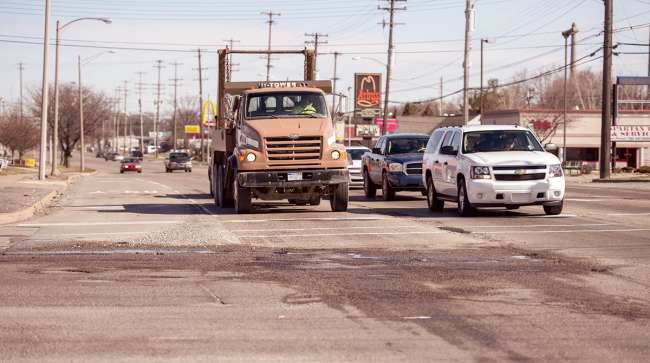Staff Reporter
ASCE Report: Underfunded Infrastructure Will Seriously Impact Economy

[Stay on top of transportation news: Get TTNews in your inbox.]
Failure to properly invest in the nation’s deteriorating surface transportation infrastructure will inflict significant negative consequences on the economy, according to preliminary findings from the American Society of Civil Engineers.
ASCE released the preliminary findings, packaged in a report titled “Failure to Act,” during a virtual event Sept. 23. The findings come from a yearlong analysis conducted by EBP, a firm that specializes in economic research to support planning and policy. ASCE President Kancheepuram “Guna” N. Gunalan said a final report based on these preliminary findings will be released later this year.
The report states the nation’s surface transportation infrastructure has been underfunded for years and continues to experience deterioration in its condition and capacity to perform. Some $4.1 trillion will be needed from 2020 through 2039 to sustain surface transportation infrastructure nationwide, according to the research. During this period, about $2 trillion in spending is projected, leaving an investment gap of $2.1 trillion.
The report indicates certain industries will be heavily impacted by infrastructure inefficiencies. Such inefficiencies include congestion; between 2012 and 2017, the report says truck congestion delay costs increased by 35%. In 2039, the truck transportation sector will have a projected direct cost impact of $40 billion because of deficient infrastructure.

Home | Video | Heroes' Photo Gallery
Saluting the men and women of the trucking industry who kept America's essential goods flowing during the coronavirus pandemic.
Heroes: Peter Lacoste | Susan Dawson | James Rogers | Reggie Barrows | Kevin Cooper | Cesar Quintana Moreno
Steven Landau, executive vice president at EBP-US and lead author of the report, noted that major costs will be borne by trucking companies and logistics firms.
“In a congested condition, it could take more time to transport a good from point to point, so they might need more drivers, for example,” Landau said. “It is a cascade of effects.”
According to the analysis, the federal-aid highway system is reasonably maintained, but will experience gaps in the future due to the difference between spending estimates and what actually is required to be spent to rehabilitate pavement. Over the next 20 years, some $53 billion annually will be required to rehabilitate pavement and other operational conditions, such as highway geometry. However, projected spending is estimated to be $41 billion annually. This $12 billion annual funding gap means spending must increase 29% over current levels.
The report notes that if investment in highways, bridges and transit systems continues at current levels, businesses and households will incur about $2 trillion in extra costs over 20 years. If industry costs are passed down to consumers, costs per household may be even higher.
Failure to Act by Transport Topics on Scribd
Costs incurred by households and businesses eventually will ripple outward, increasing prices and decreasing profits of services provided by businesses, which will in turn lead to reductions in wages and disposable income. Meanwhile, households will have to divert more money from other purchases to offset transportation costs. The analysis estimates that $6.2 trillion in national gross output will be lost from 2020 through 2039.
“Added costs also impact the ability for businesses to reinvest in the economy and translates to being less competitive in a global environment,” Gunalan said. “It has a vicious cycle effect on the economy.”
Panelists indicated that increased, sustainable funding is key to addressing the country’s infrastructure problems. Kristina Swallow, director of the Nevada Department of Transportation, said an increase to the federal fuel tax rate would help state departments of transportation keep up with their programs. The federal fuel tax, which supports the Highway Trust Fund, has stagnated at 24.4 cents a gallon for diesel and 18.4 cents a gallon for gasoline since 1993.
"It's far from what we had hoped ... we will work with Congress so we can find a robustly funded long-term bill at this time next year," Kristina Swallow of @nevadadot on the one-year #FASTAct extension, which doesn't ensure long-term federal funding for surface transportation pic.twitter.com/wezHNOJ2dr — ASCE Gov't Relations (@ASCEGovRel) September 23, 2020
“The federal fuel tax has remained flat for almost 30 years,” Swallow said. “We can’t build our way out of congestion. At some point, we still need to provide for the increased growth of our cities, and that will require increased revenue.”
The speakers also indicated a one-year extension of the Fixing America’s Surface Transportation (FAST) Act is a positive step, but not a lasting solution.
Ed Mortimer, vice president of transportation and infrastructure at the U.S. Chamber of Commerce, pointed out the engineering community has been informing policymakers and congressional representatives about the nation’s pressing infrastructure problems for a while.
“I wish I could say this is new news,” Mortimer said. “The federal government has to get serious about coming up with sustainable revenue and a long-term vision for a 21st-century network. They haven’t done their job. It doesn’t matter who is going to be in office next year. We need to have bipartisan solutions.”
Want more news? Listen to today's daily briefing:
Subscribe: Apple Podcasts | Spotify | Amazon Alexa | Google Assistant | More

